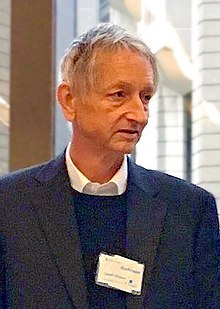Geoffrey Hinton
Geoffrey Hinton | |
|---|---|
 Hinton in 2016 | |
| Born | Geoffrey Everest Hinton 6 December 1947[1] Wimbledon, London, England |
| Education | |
| Known for |
|
| Awards |
|
| Scientific career | |
| Fields | |
| Institutions | |
| Thesis | Relaxation and its role in vision (1977) |
| Doctoral advisor | Christopher Longuet-Higgins[2][3][4] |
| Doctoral students | |
| Other notable students | |
| Website | www |
Geoffrey Everest Hinton CC FRS FRSC[11] (born 6 December 1947) is a British-Canadian cognitive psychologist and computer scientist. He is known for his work on artificial intelligence (AI). From 2013 to 2023, he worked for Google (Google Brain) and the University of Toronto. In May 2023, he left Google after calling out the risks of artificial intelligence technology.[12]
References[change | change source]
- ↑ Anon (2015) Hinton, Prof. Geoffrey Everest. Who's Who (online Oxford University Press ed.). A & C Black, an imprint of Bloomsbury Publishing plc.
{{cite book}}:|website=ignored (help) doi:10.1093/ww/9780199540884.013.20261
doi:10.1093/ww/9780199540884.013.20261
- ↑ Geoffrey Hinton at the Mathematics Genealogy Project
- ↑ "Geoffrey E. Hinton's Academic Genealogy". Archived from the original on 23 March 2017. Retrieved 15 December 2013.
- ↑ Gregory, R. L.; Murrell, J. N. (2006). "Hugh Christopher Longuet-Higgins. 11 April 1923 -- 27 March 2004: Elected FRS 1958". Biographical Memoirs of Fellows of the Royal Society. 52: 149–166. doi:10.1098/rsbm.2006.0012.
- ↑ Zemel, Richard Stanley (1994). A minimum description length framework for unsupervised learning (PhD thesis). University of Toronto. OCLC 222081343. ProQuest 304161918.
- ↑ Frey, Brendan John (1998). Bayesian networks for pattern classification, data compression, and channel coding (PhD thesis). University of Toronto. OCLC 46557340. ProQuest 304396112.
- ↑ Neal, Radford (1995). Bayesian learning for neural networks (PhD thesis). University of Toronto. OCLC 46499792. ProQuest 304260778.
- ↑ Whye Teh, Yee (2003). Bethe free energy and contrastive divergence approximations for undirected graphical models. utoronto.ca (PhD thesis). University of Toronto. hdl:1807/122253. OCLC 56683361. ProQuest 305242430. Archived from the original on 30 March 2023. Retrieved 30 March 2023.
- ↑ Salakhutdinov, Ruslan (2009). Learning deep generative models (PhD thesis). University of Toronto. ISBN 978-0-494-61080-0. OCLC 785764071. ProQuest 577365583.
- ↑ Sutskever, Ilya (2013). Training Recurrent Neural Networks. utoronto.ca (PhD thesis). University of Toronto. hdl:1807/36012. OCLC 889910425. ProQuest 1501655550. Archived from the original on 26 March 2023. Retrieved 30 March 2023.
- ↑ Anon (1998). "Professor Geoffrey Hinton FRS". Royal Society. London. Archived from the original on 3 November 2015. One or more of the preceding sentences incorporates text from the royalsociety.org website where:
"All text published under the heading 'Biography' on Fellow profile pages is available under Creative Commons Attribution 4.0 International License." --"Royal Society Terms, conditions and policies". Archived from the original on 11 November 2016. Retrieved 2016-03-09.
- ↑ Douglas Heaven, Will (1 May 2023). "Deep learning pioneer Geoffrey Hinton quits Google". MIT Technology Review. Archived from the original on 1 May 2023. Retrieved 2023-05-01.
